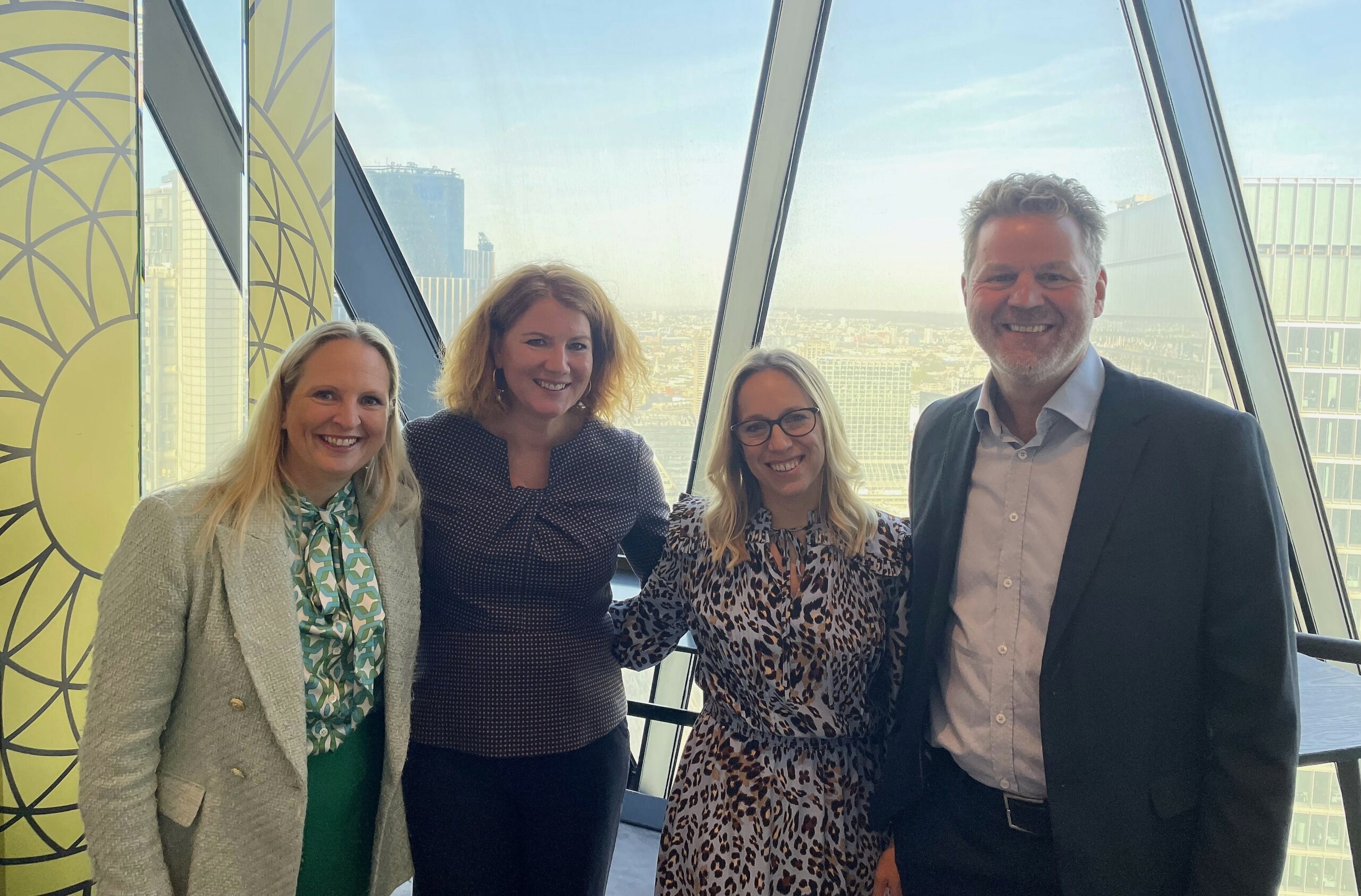
14 Nov Supporting organic diversity in law firms: how General Counsel and senior law firm partners can work together to drive change
In October 2022 Marsden hosted a breakfast roundtable for more than 20 General Counsel and law firm senior leaders. The topic was ‘Supporting Organic Diversity in Law Firms’ – a free-ranging conversation on how we can all work together to create an environment to support the promotion of women in law firms and improve diversity to the benefit of all.
At Marsden, diversity is one of our core values and as part of this we remain committed to supporting women in the legal sector. The event was a follow up to a previous Roundtable in March we hosted for ‘future leader’ female senior associates and in-house counsel, where it was agreed that much more work was needed to bring law firms and clients closer together to support female associates and enable them to pursue partnership rather than leave. Our second roundtable was designed to do just this, to support and move the conversation forward.
Three key themes emerged from the debate:
Clients and law firms need to communicate more effectively
Law firms are client-facing businesses, and ultimately they need to get the work done. They feel under huge pressure to provide the best service in the quickest timeframe for the right price. Often this means that they staff the same teams on transactions – for clients, law firms feel that familiarity is important, particularly for those that only do a few deals a year. Sometimes, this may mean that they don’t always field lawyers that require flexibility. If they do, they don’t then set those lawyers up for success by telling the client at the start of the deal or relationship that they intend to field a diverse team that is the best for it.
Supporting women in law firms isn’t just about providing flexibility, but we had a valid discussion in relation to how clients and law firms can open up dialogue and work together to increase flexibility, which would help the situation. Many law firms are under huge pressure to offer their staff flexible working practices, and some are making genuine progress in this area. But, as noted above, they don’t always tell the client they can offer this and instead put others on the team. Clients can help by opening the conversation – there was consensus that it’s sometimes easier for them to do this than the law firm.
Asking clients in advance how they would feel about having some team members that need a degree of flexible working would not only demonstrate inclusive leadership at its best but some around the table even suggested that this should be a selling point rather than assuming that it will be seen as a ‘weakness’ and a risk of losing the work to another firm. One General Counsel was clear that they wouldn’t change to another firm who happened to be cheaper if they had a current deep relationship, and that law firms should be more assertive in supporting their female lawyers.
Another General Counsel mentioned that a law firm once ‘admitted’ they had a team member working remotely and wondered why they were not being transparent about it. A third had already had the discussion with their law firm about flexibility needs, and said that he now has a consistent “A-team” on each deal and improved quality, having achieved an understanding which works for both sides.
Staffing teams differently
Many General Counsel in the room pointed out that in order for them to deliver to their internal client (the business), the continuity of the external legal team on a single transaction was felt to be important; rather than team members covering for others, perhaps it would be better to highlight that some tasks might be delayed slightly rather than pass the task onto another team member. Some noted several occasions on deals where both in-house and law firm female team members were trying to pretend they were not working flexibly!
Law firms traditionally structure teams in a hierarchical fashion – a partner, senior associate, associate, trainee – which can cause problems if people want to work more flexibly to allow them to continue to progress in the law firm but also spend time with young families. Some noted that perhaps law firms need to think more creatively and balance teams more to allow for lawyers to cover for each other more easily. Progress can be made in this regard around resilience of teams and work allocation, leading to less burn-out and an ability to have a rewarding law firm career and a life outside the office. Women in particular should not feel they have to give the impression they are available at all times and perhaps clients need to challenge law firms that do appear to offer this.
Of course it is not always women that may need flexible working patterns. An increasing number of men do too, but we generally do not make the same assumptions as we do with women and we need to tackle the bias around this. It was noted that it is not until men are able and allowed to share in the home and caring responsibilities (which has been expediated due to Covid) that we will be on our way to creating time and space for women to thrive as equally at work. As one senior law firm partner noted, large law firms fielding big teams on a deal should be able to accommodate requests for flexibility and still be able to get the work done on time and on budget.
While the pandemic has normalized flexible working patterns for men and women, it still needs buy-in from across the board. A male junior associate should not feel ‘dumped on’ by a woman with children, but made to feel that it is okay for him to ask for flexibility if he needs it for other reasons.
Perhaps at the pitch or tender stage for new work, clients need to flag that they are open to a discussion about team composition and what arrangements may or may not need to be in place. It would get the conversation started and the General Counsel in the room agreed that they have a part to play in initiating these conversations.
Working together to drive change
If flexibility is only part of the puzzle, what else is holding women back? There was a record number of promotions of women to partner in the Magic Circle in 2021, but it was still only 38% of the total and fewer in transactional areas (Source: Financial News, 4 May 2022)
It is clear that both male and female leaders need to be visible in promoting diversity initiatives. Many law firms are still male-dominated at the senior levels and they need to be seen as part of the drive for change. This includes awareness when events or other initiatives are too male-dominated to ensure gender balance.
This leads onto fair work allocation. Men are much more likely to give work to men ‘like them’. The majority of clients are still male and women need to be allowed a chance to build relationships with clients. Many felt that there was a myth around business development – men are more likely to go out and network, but in reality relationships are actually built on the deal. One private equity partner has a very male-dominated client and will often field an all-female team rather than try and ‘match’ the client – which they appreciated and it worked well, since they were the best lawyers for the transaction, not the ones that ‘fitted’.
Diverse teams need to go beyond the pitch book, and be present on the transaction itself to avoid a ‘box-ticking’ culture. Some General Counsel stated that they actively track whether the lawyers fielded in the pitch do actually have a role in the transaction. Law firms should be able to provide diversity and flexibility and the clients need to react favourably and positively.
We were encouraged that of the 22 senior lawyers around the table, 10 were men and had committed to joining the discussion. It is evident that more progress is needed. For example, we have heard from some junior female law firm partners that they would like to get more actively involved in diversity issues, but as this might detract from their client development hours they felt discouraged, since it might hamper their chances of becoming an equity partner. Others in the Roundtable were frustrated that their firms only funneled women towards diversity discussions and initiatives when the men also need to be part of the discussion.
What actions will participants take?
So, after a fruitful discussion, would General Counsel and law firm management do anything differently? Many partners said they would discuss the issues with their teams; some General Counsel said they would aim to work in a more collaborative way with the law firms they have good relationships with and want to continue working with.
It was broadly agreed by all that inclusive leadership by both men and women in companies and law firms is vital; they need to lead by example, challenge embedded cultures and behaviours and help generate change.
We are confident that those attending the Roundtable left with much food for thought and this in itself will help to continue to drive change; and we are planning future events to keep the discussion front of mind.
Image: The Marsden team leading the Roundtable: Ann-Marie Goodbody, Michelle Mills, Karen Glass, Jonathan Marsden.
